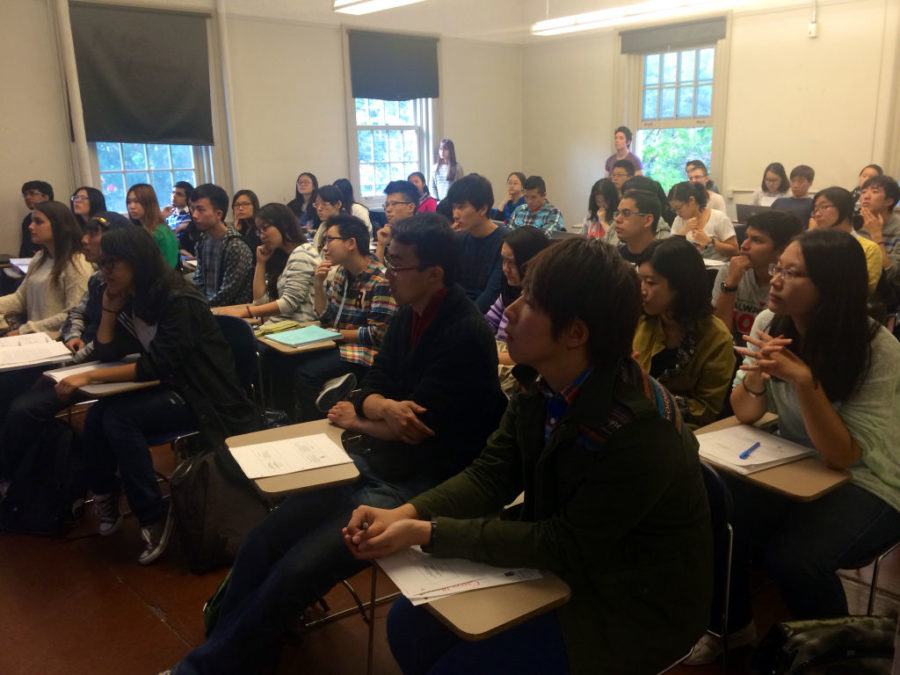International students encounter difficulties finding US jobs, internships
Students gathered in the English Building on Tuesday to attend a workshop presented by the ICC Program and organized by the Career Center on how international students can earn jobs and internships. Photo by Liyuan Yang
Oct 9, 2014
Last updated on May 11, 2016 at 01:31 a.m.
As more international students study in the U.S., getting jobs and internships has become a problem that many foreign students are facing.
The Open Doors Report on International Educational Exchange showed that the number of international students at universities in the U.S. increased by seven percent to a record high of 819,644 students in the 2012-13 academic year.
This year, 9,871 international students are enrolled at the University and account for 22 percent of the student body.
Career fairs are held at the University every fall and spring semester, which attract global enterprises such as Boeing, Nestle and Yelp. Although international students are presented with the resources, many have found that they aren’t being offered jobs and internships because they’re not from the U.S.
Get The Daily Illini in your inbox!
“I was very disappointed. You know my grades are pretty good, and I got rejected just because I am an international student. It’s like finding something you cannot really change,” said Dylan Blommaert, graduate student from the Netherlands in the College of Law.
There are four problems international students may encounter while looking for jobs and internships according to Un-Yeong Park, a doctoral student in Human Resource Development and career coach at the International Student Career Certificate program at the Career Center.
Park said common problems include: a limited number of work visas, communication skills, cultural awareness and a lack of work experience.
The U.S. Citizenship and Immigration Services grants 85,000 H-1B, or temporary work, visas annually for anyone looking for a job in the U.S. These visas allow U.S. businesses to hire foreign graduates of U.S. universities. The businesses are responsible for paying for the visas, which typically cost from $6,000 to $8,000, said Park.
While the cap for visas sits at 85,000 per year, as of April 2014, U.S. businesses had already filed for 172,500 H-1B petitions.
In this case, a lottery will be held to determine which businesses will receive the available visas.
“I think the competition is very furious and tough”, Park said. “Less than 10,000 jobs are available to international undergraduate students who graduated recently.”
The total temporary work visas account for international applicants of all ages and professional backgrounds, not just students and recent graduates.
Park said that many companies are hesitant to hire or recruit international students for internships because they see interns as a future talent pool; however, if they cannot hire those students to work full time after the internship ends because the students will not be able to continue to work in the U.S. without a temporary work visa, the company loses what they invested in the intern.
Park created the ICC Program to help international students pursue a career in the U.S. The program teaches different job and interview strategies, such as elevator pitches to improve communication skills. He said some international students struggle with engaging in conversations with interviewers especially when it comes to asking the interviewer questions.
“Communication is a much broader concept than the language problem,” said Park. “Communication involves the verbal and writing, and your writing should be very concise and persuasive and your verbal skills should be articulate.”
The center also helps students become aware of the diverse culture in the U.S., which Park said is critical for students that want to pursue a career in the U.S.
“In the U.S. it’s very individualistic whereas in China, Korea and even India, we are very collectivistic,” Park said.
As international students continue to adjust, Park said it’s important for students to find a balance between their academic performance and professional skill development.
“They need to understand what they are, and who they are,” Park said.
Many students are focused on the U.S. market, however, Park said there are many other countries that have potential career opportunities available to international students.
“If you go outside the U.S. border, there are many countries welcoming you.”
Liyuan can be reached at [email protected].






